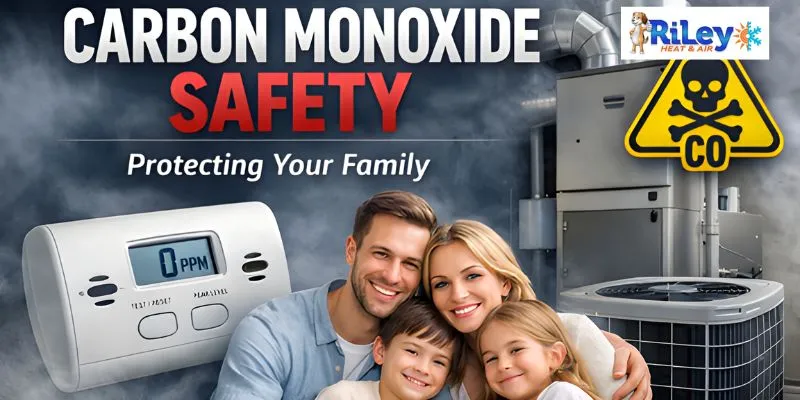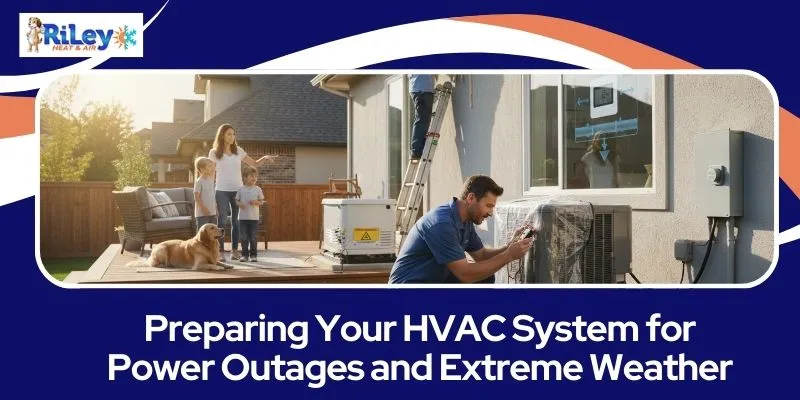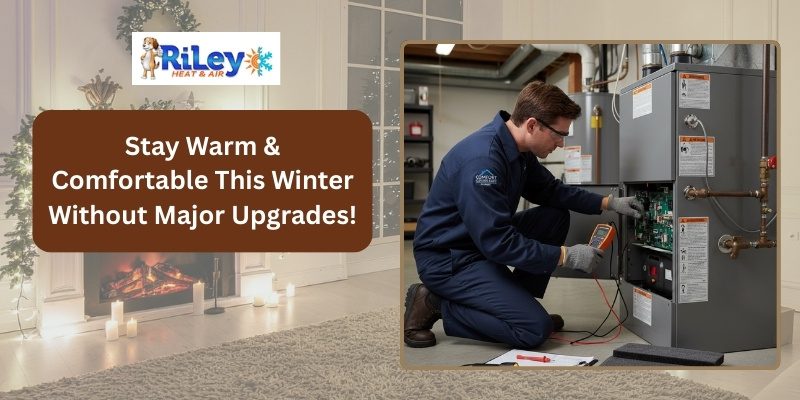
Winter Allergies & Your HVAC: How Your Heating System Can Trigger Symptoms
As soon as winter arrives, people throughout Maryland rely on their heating systems to stay warm. However, not many people know that the same HVAC system that helps keep them comfortable may also aggravate allergy symptoms.
Your heating system can directly have an impact on your respiratory health and indoor air quality.
How Heat Systems Affect Allergies
Your heating and cooling system does not just control the temperature; it continuously circulates air in your home. It also disperses the dust, mold spores, pet dander, and other air pollutants that may cause allergies or aggravate the symptoms of asthma, unless maintained.
- Dust and Mold in Ducts: With time, dust materials settle in ductwork, mainly in older and seldom serviced systems. These particles are emitted into your living room when the heat is switched on.
- Pet Dander and Hair: Pet dander is tightly contained within the walls of closed windows during the winter season, which results in pets re-introducing previously trapped indoor allergens with each heating cycle.
- Mold Growth: This is because warm and damp conditions of HVAC systems may lead to mold proliferation, which releases spores that lead to respiratory irritation.
- Dry Indoor Air: Forced-air heating can dry out the air and irritate your nose and increase your sensitivity to allergens.
All these factors put together are the contributors to the poor indoor air quality, which is a major issue with Maryland homeowners during their long heating seasons.
Recognizing the Signs of HVAC-Related Allergies
The symptoms of allergy might be easily confused with seasonal colds. Nevertheless, when you feel uncomfortable in your home, at your workplace, or the discomfort increases after turning on your heating system, your HVAC might be the cause of this problem.
Common signs include:
- Chronic sneezing, cough, or stuffiness in the nose.
- Watery, itchy eyes when indoors.
- A stuffy smell or mouldy appearance around registers.
- The unusual dust accumulation around ducts or vents.
When all these happen at the same time, then it is high time to check the state of your HVAC system and the level of filtration of the air.
Key Winter Allergens Circulating Through HVAC Systems
- Dust Mites: This is a warm indoor insect and can be easily carried by ducted air. Their microscopic waste particles are one of the causes of winter flare-ups of allergies.
- Pet Dander: Flakes of skin and fur are suspended in the air and are deposited in filters and vents.
- Mold Spores: Grow in the humid places of the HVAC parts, particularly where the drainage systems or filters are not taken care of.
- Indoor Pollutants: The cleaning products, smoke, and VOCs (volatile organic compounds) are spread further in closed winter houses with less ventilation.
How to Minimize the Symptoms of Allergy Caused by HVAC
One of the most effective ways to reduce allergens and improve indoor air quality is through proper HVAC maintenance. The following are some of the actionable tips that Riley Heat and Air suggests:
1. Regularly Replace Air Filter
Allergens are blocked by your HVAC filter.
- To achieve a better filtration, the use of HEPA filters or filters with an 8-13 rating of MERV is encouraged.
- Change every 1 to 3 months or earlier in case of pets or allergies.
- Do not install low-cost fiberglass filters with low filtering capacity.
2. Schedule Cleaning of Ducts
Dust and debris can be trapped in ducts, which can transmit allergens with each activation of the system.
- Dust and mold are to be reduced considerably through such professional furnace and duct cleaning.
- EPA recommends having ducts cleaned every 3-5 years or when they appear to have an observed buildup or smell.
3. Maintain Proper Humidity Levels
Very important in respiratory comfort is the humidity equilibrium.
- The moisture level in the house should be 30-50 percent, not too dry or form molds.
- Install a dehumidifier or a whole-house humidifier to make sure that the humidity is kept constant.
4. Keep Vents and Registers Clean
Dust gathers extremely fast on vents.
- Vacuum and dry with a wet cloth.
- Ensure that pieces of furniture or drapery do not block any air ducts, as this will overload your system and collect particles.
5. Upgrade Your HVAC System
However, in case your system is more than ten years old, it might not be efficient to filter allergens.
- New models of HVAC have high-tech air purification and intelligent filtration.
- Consider installing UV light air cleaners or electrostatic filters to neutralize bacteria and mold.
6. Use Air Purifiers for Added Protection
Combine an HVAC with HEPA-certified air purifiers in bedrooms and living areas.
- Such gadgets trap airborne pollutants that are smaller than those caught by normal filters.
- They are instrumental in homes with pets or smokers.
Improving Indoor Air Quality: The Maryland Perspective
Maryland winters are typically characterized by closed-up houses and prolonged use of HVAC systems, providing the perfect habitat for allergens to propagate. According to Riley Heat and Air, indoor air quality specialists, the most effective method of maintaining healthy indoor air throughout the year is preventative maintenance.
Their allergy-friendly HVAC maintenance plans are based on:
- Check the ducts to see whether they are damp or not.
- Checking the quality of filters and fittings.
- Humidity control calibration.
- Blower cleaning of the coils and parts.
- Verifying the leakages of dust and debris.
The steps would not only improve the quality of air, but also increase the life of your system and minimize the energy expenses.
Preventative HVAC Maintenance Checklist for Winter Allergies
To contain allergens during winter:
- Replace filters every 30–90 days
- Have a professional HVAC check performed prior to heating.
- Maintain humidity between 30–50%
- Vacuum and clean air vents once a week.
- Apply vacuums and purifiers with HEPA.
Conclusion
The HVAC system does not need to be the cause of winter allergies, as it can be uncomfortable to stay at home. Regular replacement of air filters in your HVAC system, clearing of ducts, and maintaining a consistent humidity level in the air can significantly improve the quality of indoor air.
Collaborating with professionals like Riley Heat & Air ensures that your heating system will be efficient and allergen-free. With a sterile HVAC system, you can enjoy healthier air and a more comfortable winter season for you and your family.






